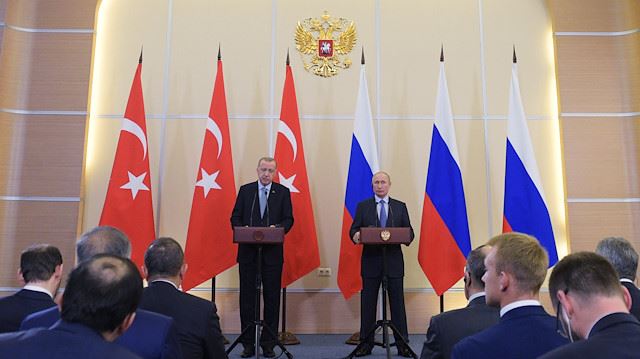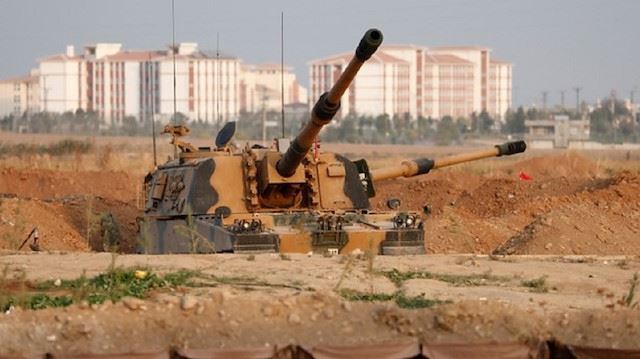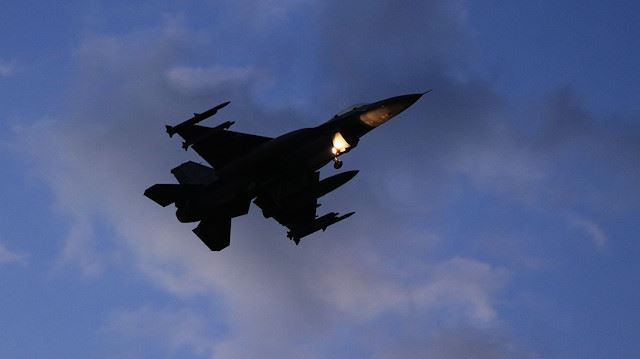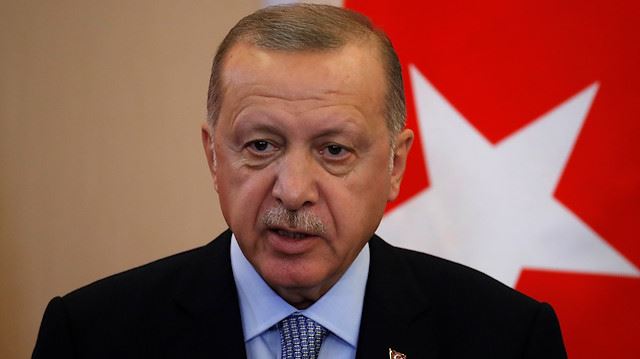A column of Russian military police arrived in Ayn el-Arab (Kobani) in northern Syria, Russia's Defence Ministry said on Wednesday. "In accordance wit
A column of Russian military police arrived in Ayn el-Arab (Kobani) in northern Syria, Russia’s Defence Ministry said on Wednesday.
“In accordance with the agreements reached by the presidents of Russia and Turkey on October 22 in Sochi, today, at 12 o’clock, a column of Russian military police crossed the Euphrates river and moved in the direction of the Syrian-Turkish border,” the ministry said in a statement.
Ankara agreed with Washington on Oct. 17 to pause its operation for 120-hours to allow the withdrawal of YPG/PKK terrorists from the planned safe zone.
On Tuesday, Turkish President Recep Tayyip Erdoğan and his Russian counterpart Vladimir Putin held a “historic” meeting in the Black Sea resort town of Sochi just hours before the pause was set to expire.
Ankara and Moscow reached a deal under which YPG/PKK terrorists will pull back 30 km south of Turkey’s border with northern Syria within 150 hours, and security forces from Turkey and Russia will start to conduct joint patrols in the region.
In its more than 30-year terror campaign against Turkey, the PKK — listed as a terrorist organization by Turkey, the U.S. and the European Union — has been responsible for deaths of 40,000 people, including women, children and infants. The YPG is the Syrian offshoot of the PKK.
Erdoğan: YPG/PKK will not stay in Syria border region in ‘regime clothes’
Turkish President Tayyip Erdogan was quoted as saying Wednesday that Russian President Vladimir Putin assured him that YPG/PKK terrorists will not be allowed to remain in Syria along the Turkish border wearing “regime clothes.”Erdoğan made the comment to broadcaster NTV during his return flight from the Black Sea resort of Sochi, where he met with Putin on Tuesday.At the meeting, Ankara and Moscow agreed that YPG/PKK terrorists and their weapons would be removed from areas along the Syrian-Turkish border region that were not included in a previous similar deal with the United States.

YPG/PKK pullout in line with Sochi deal starts in Syria
In line with the agreement between Turkey and Russia on Tuesday, the YPG/PKK terror group’s withdrawal from northern Syria started as of 12.00 p.m. local time (0900 GMT) on Wednesday.According to the deal between Ankara and Moscow, YPG/PKK terrorists will pull back 30 kilometers (18 miles) south of the Turkish border in northern Syria within 150 hours.On Oct. 9, Turkey launched Operation Peace Spring to eliminate terrorists from northern Syria east of the Euphrates River in order to secure Turkey’s borders, aid in the safe return of Syrian refugees, and ensure Syria’s territorial integrity.Ankara agreed with Washington on Oct. 17 to pause its operation for 120-hours to allow the withdrawal of YPG/PKK terrorists from the planned safe zone.On Tuesday, Turkish President Recep Tayyip Erdogan and his Russian counterpart Vladimir Putin held a “historic” meeting in the Black Sea resort town of Sochi just hours before the pause was set to expire.Ankara and Moscow reached a deal under which YPG/PKK terrorists will pull back 30 km south of Turkey’s border with northern Syria within 150 hours, and security forces from Turkey and Russia will start to conduct joint patrols in the region.In its more than 30-year terror campaign against Turkey, the PKK — listed as a terrorist organization by Turkey, the U.S. and the European Union — has been responsible for deaths of 40,000 people, including women, children and infants. The YPG is the Syrian offshoot of the PKK.

Russia calls on YPG/PKK to withdraw from Syrian border
The Turkish army will crush the YPG/PKK terrorists if they do not withdraw from the Syrian border, Russian presidential spokesman said on Wednesday.The agreement, reached by Turkish and Russian presidents in Russia’s coastal city of Sochi on Oct.22, suggests the removal of YPG/PKK elements and their weapons from the region, Dmitry Peskov told reporters.Peskov said if YPG/PKK do not pullout, the Syrian forces and Russian police will step aside, and YPG/PKK will be “run over by a Turkish military machine”.The Kremlin spokesman advised YPG/PKK not to wait for any help from the U.S., as the country has “abandoned its allies”, leaving them on the Syrian border and “almost pushing them to fight with Turkey”.On Oct. 9, Turkey launched Operation Peace Spring to eliminate terrorists from northern Syria east of the Euphrates River in order to secure Turkey’s borders, aid in the safe return of Syrian refugees and ensure Syria’s territorial integrity.Ankara agreed with Washington on Oct. 17 to pause its operation to allow YPG/PKK terrorists to withdraw from the planned safe zone.On Tuesday, Turkish President Recep Tayyip Erdogan and his Russian counterpart Vladimir Putin held a “historic” meeting in the Black Sea resort town of Sochi just hours before the pause was set to expire.Ankara and Moscow reached a deal under which PKK/YPG terrorists will pull back 30 kilometers (19 miles) from Turkey’s border with northern Syria within 150 hours and security forces from Turkey and Russia will conduct joint patrols there.In its more than 30-year terror campaign against Turkey, the PKK — listed as a terrorist organization by Turkey, the U.S. and the European Union — has been responsible for deaths of 40,000 people, including women, children and infants.

Turkey to re-evaluate plan for NE Syria observation posts
Turkey will re-evaluate its plan to establish 12 observation posts in northeastern Syria, Turkish security sources said on Wednesday after Ankara and Moscow struck a deal calling for the YPG terror group to withdraw from the border area.The sources said there was no need for a new military operation following the withdrawal of the YPG from an area seized by Turkish-led forces in a cross-border offensive launched on Oct. 9.
